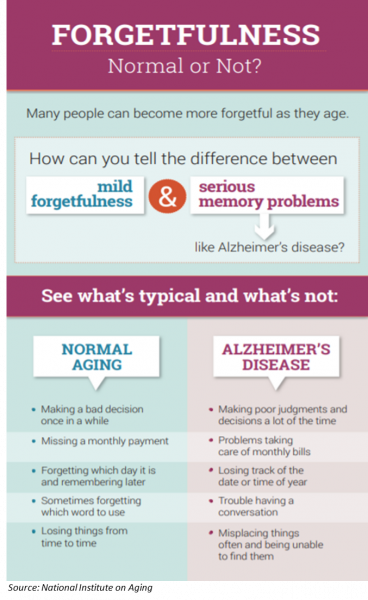Forgetfulness can look a lot of different ways.
As we age, our bodies, including our brains, go through a variety of changes. Forgetting someone’s name, where you put your keys or even a special event doesn’t mean that you or your loved one has a serious memory problem. Forgetfulness can be a normal part of aging. However, if forgetful events become more pronounced or frequent, it could be time to talk to your healthcare provider about memory changes and memory loss.
Different Types of Memory Loss
As with many health conditions, memory changes don’t impact people equally. Some older adults have more memory or thinking problems than others.
Mild cognitive impairment (MCI)
 Mild cognitive impairment (MCI) is a type of forgetfulness that doesn’t impact a person’s day-to-day schedule or their relationships. The National Institute on Aging (NIA) indicates the following as signs of MCI.
Mild cognitive impairment (MCI) is a type of forgetfulness that doesn’t impact a person’s day-to-day schedule or their relationships. The National Institute on Aging (NIA) indicates the following as signs of MCI.
- Losing things often
- Forgetting to go to important events or appointments
- Having more trouble coming up with desired words than other people of the same age
In addition to age, memory changes can also be attributed to some medical conditions, medications and mental health concerns like depression, anxiety and even stress. Consider why types of forgetfulness you or your loved one is having. Has it started abruptly or can it be correlated to any specific change in routine? Have you had a recent physical and checked for straightforward conditions like a urinary tract infection? It’s helpful to engage your healthcare provider when you have questions about memory changes. They may be able to help. For some people with MCI, memory exercises, games or even learning a new activity can improve their ability to remember.
Dementia
Dementia is not a normal part of aging. The NIA explains that dementia is a general term used when someone has a decline in mental ability that’s severe enough to interfere and disrupt daily life. It can include a loss in cognitive function – thinking, remembering, learning and reasoning – as well as a change in behavioral abilities. Dementia presents in a variety of ways and is typically progressive meaning it starts out slowly and can gradually get worse.
While memory loss is most common, it isn’t the only sign of dementia. People with dementia may also have problems with language skills, visual perception or paying attention. Some people also have personality changes. Some examples of dementia include:
- Problems with short-term memory
- Keeping track of a purse or wallet
- Remembering to pay bills or keep appointments
- Planning and preparing meals
- Traveling out of the neighborhood
Alzheimer’s Disease
Alzheimer’s Disease is the most common cause of dementia and accounts for 60-80% of all dementia cases. It’s important to understand that Alzheimer’s is a specific disease. Dementia is not.
The Alzheimer’s Association explains this disease as a degenerative brain disorder caused by complex brain changes after cell damage. It leads to dementia symptoms that gradually get worse over time. The most common early symptom of Alzheimer’s is trouble remembering new information because the disease typically impacts the part of the brain associated with learning first. Other symptoms associated with Alzheimer’s include:
- Challenges in planning or solving problems
- Difficulty completing familiar tasks
- Confusion with time or place
- Trouble understanding visual images and spatial relationships
- Changes in mood and personality
Alzheimer’s symptoms can get more severe causing people to become disoriented, confused or experience uncharacteristic behaviors. It can even make it difficult to speak, swallow or walk.
Caring For Someone With Memory Loss
Caring for someone with Alzheimer’s can be particularly challenging. Symptoms can progress to where it’s extremely difficult or even impossible to continue care at home. If you or a loved one needs help, make sure the resource or community you choose includes professionals who are trained in caring for those with severe memory loss.
Calyx Living has a dedicated, signature program for memory care residents. The Garden Place includes a comprehensive holistic approach to care that stimulates connections through sensory games, movement, food, music and art. Memory care residents at Calyx are immersed in a therapeutic activity program designed to engage their imagination, promote creativity and enhance physical skills. All programs are guided by our warm, familiar team members in a calm, stable atmosphere. In addition, Calyx has specially designed and dedicated group spaces and individual rooms for residents with dementia and Alzheimer’s. This includes welcoming, secure activity rooms and outdoor spaces for visits with family and friends.
If you or a family member is experiencing memory changes, talk with your doctor. Document the little changes you notice so you can have informed conversations and determine if any interventions or special care is needed. The team at Calyx Living has years of experience supporting and guiding families through the type of transitions that come when memory is impaired. Contact our team early for helpful information and to understand how a residential community could benefit your loved one and give you peace of mind.
